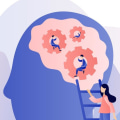Mental and physical health are equally important components of overall health. For example, depression increases the risk of many types of physical health. Facts and statistics · Questionnaire · Stress and Coping · Concepts of Wellbeing Mental and physical health are equally important components of general health. For example, depression increases the risk of many types of physical health problems, including long-lasting conditions such as diabetes, heart disease, and stroke.
Similarly, the presence of chronic diseases may increase the risk of mental illness. 2.Mental health is essential to living a happy life. It affects the way we feel, think and live our lives by encompassing our emotional, psychological and sociological well-being. Prioritizing mental health is, of course, essential.
Mental health includes our emotional, psychological and social well-being. It affects the way we think, feel and act. It also helps determine how we manage stress, relate to others and make decisions. Mental health is important at all stages of life, from childhood and adolescence to adulthood.
Your mental health is also important because it can affect your physical health. For example, mental disorders can increase the risk of physical health problems, such as strokes, type 2 diabetes, and heart disease. Mental health includes emotional, psychological and social well-being. It affects the way we think, feel, act, make decisions and relate to others.
Mental health is more than the absence of mental illness, it is essential to your overall health and quality of life. Self-care can play a role in maintaining your mental health and help support your treatment and recovery if you have a mental illness. Yes, it's important to remember that a person's mental health can change over time, depending on many factors. In addition to the impact that mental health has on your daily life, serious mental health problems can affect your relationships, your career, your education and your long-term goals.
According to a study by the National Mental Health Alliance (NAMI), 46 percent of people who commit suicide have a recognized mental health condition. Although the terms are often used interchangeably, poor mental health and mental illness are not the same thing. Promotion and prevention interventions work by identifying the individual, social and structural determinants of mental health and then intervening to reduce risks, build resilience and establish supportive environments for mental health. For students, it's more important than ever to address their mental health issues to stay mentally healthy and keep up with their educational and personal goals.
Untreated mental health is often identified with a sense of hopelessness, sadness, worthlessness, feelings of guilt, anxiety, fear, and a perceived loss of control. Learn more about the NIMH's commitment to accelerating the pace of scientific progress and transforming mental health care. According to the National Institute of Mental Health (NIMH), 1 in 5 adults now lives with a moderate to severe mental health condition. The Department of Health and Human Services refers to mental health as the “emotional, psychological and social well-being of a person”.
Emotional and mental health is important because it is a vital part of your life and affects your thoughts, behaviors and emotions. Mental health tips demonstrate how a negative mind can cause you to feel depressed, irritated, or upset. Self-care means taking the time to do things that help you live well and improve both your physical and mental health. .






